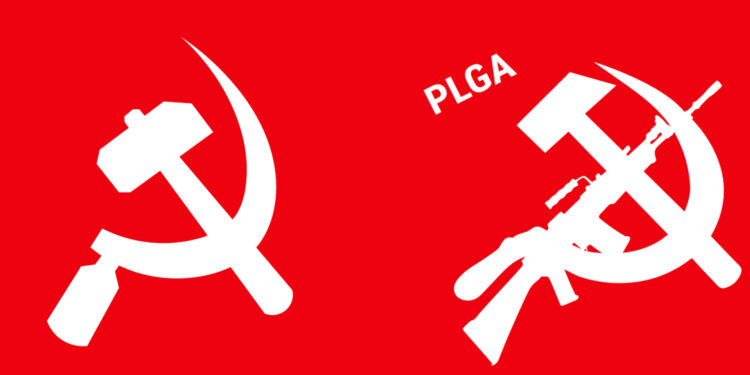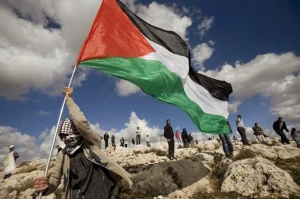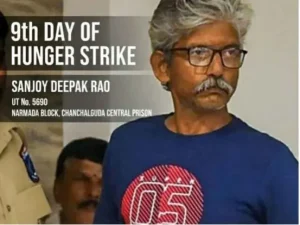
CPI (Maoist): We pledge to the People that our Party will Never Surrender to the Enemy
We hereby share a statement issued by the Central Committee of the Communist Party of India (Maoist) and shared by Yeni Demokrasi.
We call on the revolutionary people to mete out appropriate punishment to Sonu, Satish and those with them, who betrayed the revolution, are Party traitors, and surrendered to the enemy as counter-revolutionaries.
We expel Sonu and Satish’s gang from the Party.
The Central Committee of our Party reports that a total of 61 people — including Politburo member Sonu, Dandakaranya Special Zone Committee member Vivek, Dandakaranya Special Zone Committee alternate member Deep, ten regional Party committee members, Party members, and members of the PLGA (People’s Liberation Guerrilla Army) — surrendered to the police in Gadchiroli on October 14 in the presence of Maharashtra Chief Minister Devendra Fadnavis and reentered civilian life. They handed over 50 rifles belonging to our Party and the revolutionary people to the enemy. This surrender is treason against the revolution, an act shameful for the Party, and counter-revolutionary.
Since 2011 the Dandakaranya revolutionary movement has experienced difficulties, and the nationwide revolutionary movement underwent a temporary setback until 2018. Since then political weaknesses began to appear in Sonu. In the Central Committee meeting held in December 2020 Sonu submitted a document containing decisions with self-criticism regarding some shortcomings in Dandakaranya revolutionary practices. The Central Committee rejected this. In subsequent Central Committee and Politburo meetings his incorrect political tendencies were criticized and the Central Committee and Politburo made efforts to correct them. At the Dandakaranya Special Zone Committee plenum held in 2011, individualism, arrogance, and an overly bureaucratic attitude in Sonu were harshly criticized and their correction was demanded. In subsequent Dandakaranya Special Zone Committee meetings committee members raised criticisms to correct his wrong tendencies. However, after the martyrdom of our Party’s General Secretary comrade Basavaraj in the Kagar attack in May 2025, long-standing theoretical, political, and structural weaknesses in Sonu underwent qualitative changes and led him to capitulate before the enemy.
From January 2024 onwards, during the counter-revolutionary Kagar war, all revolutionaries and the revolutionary people have been fighting daily against enemy assaults. Following the martyrdom of Party General Secretary comrade Basavaraj, leading the revolutionary movement, organizing resistance against the deadly encirclement and crushing attacks carried out by central and state governments as part of the Kagar war, and standing ready to sacrifice one’s life every day became the meaning of leadership. Sonu’s increasing comfort-seeking and selfishness distanced him from revolutionary sacrifices; this resulted both in his being caught unprepared and in acting out of fear of death. He was not ready to honestly acknowledge this reality. However, by refusing to correct his long-standing arrogance, he concealed his weaknesses and fear of death and, as a result of the Party’s mistaken political-military strategy, concluded that the Indian revolutionary movement would be defeated and that there was no other way but to hand weapons over to the enemy and temporarily suspend armed struggle — publishing a conciliatory, revisionist surrender statement to that effect.”
Honest revolutionaries, or anyone who carries the revolutionary spirit, examine the reasons that have led the revolutionary movement into a temporary setback using the Marxist-Leninist-Maoist (MLM) method of analysis. For this they analyze past history, the present situation, and future possibilities. They realistically analyze the material conditions, the state of self-criticism, the enemy forces, and the strengths of the movement. In this context they also examine international and domestic conditions. However, in his recent writings, his appeals to the people, his calls to cadres, and in the press statement published on 15 September, Sonu adopted a bourgeois method of self-critical analysis that contradicts this. To prove that the Party line or the political-military line or political-military strategies were wrong, he put forward three main reasons. These are: that we do not have a revolutionary party, that the ultra-left decision taken by the unity congress formed in 2007 imposed tasks on the center beyond the strength of the movement, and the claim that we rejected legal struggles — these three are incorrect findings. In addition, by declaring the contradiction between the comprador monopoly bourgeoisie and the country’s population to be the principal contradiction, he proposed changing the path of Protracted People’s War.
If you want to change the Party’s fundamental line/strategy, you must analyze the country’s relations of production, their class relations, and the nature of the state; on the basis of that analysis you must determine the current stage of the revolution and formulate a political line/strategy. You must analyze changes in the concrete characteristics of India’s revolutionary war and, taking into account changes in the nature of strategic areas in the country, develop a military strategy. He followed a bourgeois, one-sided method of self-critical analysis that contradicts the Marxist-Leninist-Maoist method of analysis. A self-critical work/analysis method that is one-sided means a partial/incomplete, superficial method of analysis. In his recent writings, appeals to the people, calls to cadres, and in the press statement framing a temporary suspension of armed struggle, we see traces of this method. For this reason, while saying that the Party has approved the documents “Changes in the Relations of Production in India — Our Political Programme”, “The Caste Problem in India — Our View”, “The National Question in India — Our Party’s Position”, and the document limited for now to the Central Committee “The Party’s Position Against Buyer Monopoly Bourgeoisie in India — Political Programme”, he at the same time made different findings from the Central Committee’s December 2020 document “Central, Political-Structural Assessment,” which contains the reasons that caused the revolutionary movement’s setback, and from the Politburo circulars of August 2024, and finally declared that the political-military line followed by the Party was wrong. For this reason he defended, by means of a one-sided analysis, that the Party’s errors caused the revolutionary movement’s regression. He rejected the Party’s findings that the strong Indian state’s decades-long counter-revolutionary attacks, and the Kagar war, caused this situation, in addition to the Party’s self-critical errors. As long as land ownership continues to exist in residual form in the country, the contradiction between the comprador monopoly bourgeoisie and the broad masses of the people cannot be the principal contradiction. (Due to the limitations of a press statement, nothing more is written on this for now.) If Sonu truly believed what he wrote, he should have remained in the Party and been ready to discuss these matters in the Central Committee and the Politburo. If, while leading the revolutionary movement and standing ready to sacrifice his life, he had brought his ideas and theses before the Central Committee and the Politburo and worked to correct the errors in the revolutionary movement, his confidence in his theses and his honesty could have been accepted. But if, without being ready to do this, he violated the Party’s structural order and surrendered before the enemy, this shows that he did not trust his own ideas, that he was not honest, and that his theses were merely opportunistic arguments designed to hide his fear of death. To deceive revolutionary camps, Party cadres, and PLGA members with such wrong theses and to surrender to the enemy is treason against the revolution.
Not discussing his wrong theses in the Central Committee and the Politburo and violating the centralized democratic procedure by breaking organizational discipline and order, over the last few months he carried on discussions at different levels with Party committee members, Party members, and PLGA members; he prepared a conspiracy to split the Party. He systematically sidelined Party committee members, Party members, and PLGA members who were firmly loyal to the Party’s political-military line. These are anarchistic acts that demean the Party.
Sonu’s supporters may surrender to the enemy, but even though the Central Committee’s recent press statement stated that weapons belonging to the Party should be returned to the Party, he did not comply and instead handed over 50 weapons to the enemy. For many comrades who gave their lives fighting the enemy armed forces, handing over weapons captured from them to the enemy means providing weapons to the enemy to kill revolutionaries. This is counter-revolutionary. Sonu — who lost the revolutionary spirit and betrayed the revolution, a disgrace to the Party, a counter-revolutionary — and Dandakaranya Special Zone Committee member Vivek, Dandakaranya Special Zone Committee alternate member Deep, and the ten regional Party committee members who surrendered to the enemy with him, are expelled from the Party. We call on the revolutionary people to mete out appropriate punishment to these traitors who betrayed the revolution. We want Party members and PLGA members who were misled by Sonu’s deceit and petty-bourgeois ideology, who sided with him without understanding his deception and surrendered to the enemy, to understand the truth and return to the people’s side.
Since late last year, when he began planning to surrender his life partner and several others to the police in the presence of Maharashtra Chief Minister Devendra Fadnavis, recent developments indicate that Sonu has been in contact with Devendra Fadnavis and senior police officials. Thus, maintaining relations with the enemy while remaining in the revolutionary party means betraying the revolution and being a secret collaborator or agent. We state that such a traitor to the revolution has no moral authority to build the revolution by new methods.
Sonu and his gang’s surrender of 61 people to the police caused serious harm to the revolutionary movement. Now, even though Sonu and his associates have surrendered, other Party committee members, Party members, and PLGA members at various levels who were influenced by his wrong theses and are not ready to give their lives may also surrender; these are temporary losses. The effects of these losses may last relatively long. However, Sonu’s surrender and the surrender of various Party leaders and PLGA commanders do not mean the permanent defeat of the revolutionary movement.
The revolutionary movement will not be permanently defeated by the surrender of some Party leaders or some People’s War commanders. As long as classes exist in society, the oppressed classes have waged, for thousands of years, class struggles against plunder and oppression. Throughout history, although revolutionary movement leaders and military commanders in many countries have sometimes surrendered and betrayed, and although these revolutionary movements have suffered short- or long-term defeats, in some countries revolutionary movements have ultimately achieved victory. Just as there are successful revolutions in the world, defeated revolutions have also served as inspiration for the oppressed classes. Although the slave revolt led by Spartacus was defeated, it inspires today’s popular struggles; although the Paris Commune was defeated, its defeat was reviewed and lessons were learned and the Russian Socialist Revolution succeeded; these struggles still inspire the world’s working class and the oppressed. Although Bhagat Singh did not achieve national independence with the party he founded in his lifetime, his martyrdom remains an inspiration to the people today. If peoples defeated in war, their leaders, and their parties inspire the reconstruction and advancement of struggles, then those who surrendered, those popular leaders and parties who surrendered to the enemy, have faded into history by creating despair and distrust. Surrenders can never inspire the rebuilding and advancement of popular struggles and revolutionary movements. Therefore, it is deceitful for a traitor who surrendered to the enemy to claim that he will reconstruct the revolution along a new line.
Even if revolutionary leaders surrender to the enemy and hand over arms, the recent example of Nepal is proof that the people can become revolutionary again. Although the Prachanda-Bhattaarai gang handed over all the weapons of that country’s people’s liberation army to the enemy and resorted to treachery, about twenty years later honest revolutionary forces reemerged as the Revolutionary Communist Party of Nepal and participated in the latest Nepalese popular uprising, retaking enemy weapons.
In this case of revolutionary betrayal, reports have come that Satish, head of the Northern Sub-Region Office of the Dandakaranya Special Zone Committee, and three Special Zone Committee members Santu, Bhaskar (Raj Man), and Raneet surrendered to the enemy with 150 people and handed over weapons. These four Special Zone Committee members, like Sonu, split the Party and by handing Party and revolutionary people’s weapons to the enemy became traitors, a disgrace to the Party and counter-revolutionaries. Recent developments indicate that Satish has been in contact with senior police officials and the Chhattisgarh state police minister and has been secretly collaborating.
Conciliatory tendencies that Sonu and Satish have harbored for decades gradually turned into conciliation, with the Kagar war transforming that conciliatory opportunism into the present level of treason and counter-revolutionary action. We failed to correctly evaluate this development in time. As a result of this failure they both used their leadership positions to inflict serious harm on the revolutionary movement. We inform the revolutionary camp that we will review this failure and draw the necessary lessons.
It is false for the traitors Sonu and Satish to claim that they will rebuild the revolution on the right path. They are under the control of central and state intelligence bodies, and any people’s struggles or revolutionary movements they build will be government-backed popular movements. Therefore, if these traitors appear in the name of the people we call on the people to beat them and drive them away. We call upon Party members and PLGA members in those gangs to understand the betrayal now and thereafter and to return to the Party side; we guarantee that no harm will come to such returnees. We warn Sonu and Satish to immediately cease their counter-revolutionary activities aimed at splitting the Party in collaboration with central and state intelligence agencies.
Those who, due to fear for their lives because of the Kagar war offensives, may surrender can do so, but we insist that they must not hand over weapons belonging to the Party and the revolutionary people to the enemy. That would not only be treason against the revolution but also counter-revolutionary. Counter-revolutionaries must be punished by the revolutionary people.
We call on all the people of the country to continue the Indian revolutionary movement by further synthesizing and enriching our political-military line in accordance with changing social conditions and the changing concrete characteristics of the revolutionary war, using the documents ‘Changes in the Relations of Production in India — Our Political Programme,’ ‘The Caste Question in India — Our Perspective,’ ‘The National Question in India — Our Party’s Position,’ and ‘The Party’s Position Against Buyer Monopoly Bourgeoisie in India — Political Programme,’ and to carry forward the revolutionary movement in India. Setbacks and defeats in the revolution are temporary. Let us treat the situation created by the Sonu-Satish gang as a crisis developed within the Party and overcome this crisis. At this time, recognizing that our self-criticism forces have lost strength and become weak, and taking into account the situation in which the enemy has gained an advantage over our revolutionary movement, we must dedicate ourselves to rebuilding the countrywide revolutionary movement while protecting the Party, the PLGA, and our unity as a whole. Even if Sonu, Satish surrender today and someone else surrenders tomorrow, we promise the people that our Party will never surrender to the enemy. As long as classes exist, class struggles — in their higher form, People’s Wars — will continue; this is a historical rule. Surrenders cannot change this rule. Therefore, even in temporary setbacks let us advance with great confidence and courage in striving for the progress of the revolutionary movement. The final victory will belong to the people.
Revolutionary greetings,
Abhay
Authorized Representative, Central Committee
Communist Party of India (Maoist)

